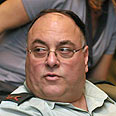
Ready, aim, seek legal counsel
In ongoing aftermath of Goldstone report, IDF assigns brigade commanders in field media advisors, humanitarian aid officers. Four generals give their perspectives, discuss media war embroiling Israel
Four senior generals sat around the table. "I came back from a public relations stint in Europe a month ago," said IDF Spokesman Brig. Gen. Avi Benayahu. "I – who never shot a bullet, who never did officers course at Bahad 1 officers' school, who doesn't even have a weapon slung over my shoulder – went around there for an entire month with 24-hour security and an alias."
An official PR tour under a fake name, I asked him. That bad?
"That bad," Benayahu answered. "And this isn't an isolated case. I remember when the chief of staff was supposed to go to a NATO conference and the plane was late. They looked for an alternate route for him, and a debate started – here they will arrest him, here they won't.
"We have to look at everything from a birds-eye view to see that an organized, planned, funded, and timed campaign of de-legitimization is being waged against Israel, against the IDF, and I'm not embarrassed to say so, against the Zionist enterprise."
Benayahu is not the only one reading the map differently and identifying a 21st century battle of new forces, no less significant than combat soldiers, along the artillery lines and the wingspans of innovative aircraft.
War 2000
In February, following the lessons from Operation Cast Lead, Coordinator of Government Activities in the Territories (COGAT) Maj. Gen. Eitan Dangot was instructed to set up a layout of humanitarian aid officers that will accompany the battalions in the field.
"These officers," according to Dangot, "are in contact with the Palestinian Authority in Judea and Samaria and with representatives of the aid organizations in the Gaza Strip and are meant to coordinate between them and the forces in the field and to indicate the locations of sensitive facilities such as hospitals, schools, and UN aid centers."
This put the number of officers who have the field commander's ear but are not part of the combat layout at three: a media advisor, or, in military language, an IDF Spokesperson Unit representative, a legal advisor, or, put otherwise, a representative of the Military Prosecution, and an advisor for humanitarian affairs, a representative of the COGAT.
Each of these advisors, separately and together, are meant to ensure that the fighting in the territories will look better and sound better, and, mainly, will prevent the next Goldstone report.
The officers in the field were not exactly enthusiastic about the idea.
"The idea is a correct one," a lieutenant colonel told me. "In the future battlefield, media, legal, and humanitarian dilemmas can dictate how the force will behave even more than topographical demands. But to say it makes it easier for us? Not at all. Even worse. In my opinion, it won't even spare us the next media onslaught."
Has the IDF read the map of the new battlefield correctly by understanding that victory does not lie solely in the hands of the soldiers, as skilled and determined as they may be, or that it is a futile effort at best and a fig leaf at worst? That war will forever be the same horrid, bleeding occurrence spawning commissions of inquiry time after time here and abroad?

Damage in Gaza, after Operation Cast Lead (Photo: AFP)
'Other side ignoring interntional law'
Yedioth Ahronoth gathered four officers for a discussion on the matter: Military Advocate General Maj. Gen. Avihai Mandelblit, COGAT Maj. Gen. Eitan Dangot, IDF Spokesman Brig. Gen. Avi Benayahu, and Judea and Samaria Commander Brig. Gen. Nitzan Alon.
"This isn't the future battlefield," said Mandelblit already at the beginning of the discussion. "This is the current battlefield. And it's not happening only in Israel, but in all countries in a similar type of conflict.
"It is an asymmetrical conflict, but not in the sense that one side has more power and the other less. This is a mistake. The conflict is asymmetrical because one side is acting according to universal rules, according to international law, fighting like cultured countries do, and the other side is ignoring these rules."
The matter is made worse, said Mandelblit, when the conflict takes place in a crowded urban area. "The most basic rule of international law addresses distinguishing between combatants and non-combatants with an emphasis on avoiding harm to civilians. We are trying to uphold this as much as possible, even when the other side is not acting according to these rules. On the contrary, the other side is attacking our civilians indiscriminately in hopes that we will return fire indiscriminately and hit their civilians.
"For them, it's a win-win situation. If you don't attack because you are concerned about hitting civilians, you are in a big problem. If you attack and hit, you lost legitimacy, and most certainly heavy pressure will be exerted against you to stop the fighting. This happened in the Second Lebanon War when Hezbollah stored strategic rockets in residential buildings and after this in Gaza with Hamas, which bases its fighting in urban areas."
It's an old story. In the Vietnam War, the Americans already were confronted with these dilemmas, as did we starting with the First Lebanon War, the first intifada and the second intifada.
"For us, this has been seen since the war that broke out in 2000."
War?
"Yes. Excuse me for correcting you, but that wasn't an intifada. It was a war."
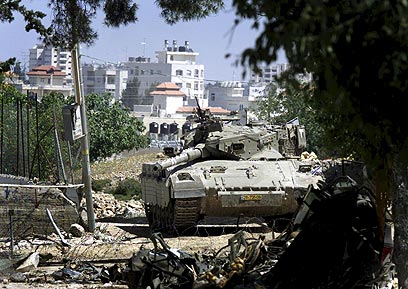
Tanks near Ramallah, Operation Defensive Shield (Photo: AP)
Dangot: "Operation Defensive Shield was a turning point. The internalization of the implications manifest in this type of fighting came later. We institutionalized the use of coordinating officers, for instance, as a lesson from Operation Cast Lead once it became clear that officers who were there were very effective and prevented targeting civilian targets that would have incurred a lot of damage for us. As of today, these officers undergo organized and structured training."
Mandelblit: "The previous military advocate general, Menachem Finkelstein, was the first to define it as armed conflict and as a war from our perspective. This definition was accepted by the Supreme Court, even though there was a disagreement in the world whether it is correct to deem actions against terrorist organizations as armed conflict."
What is the significance of the definition?
"It gives additional tools to the military. For instance, targeted assassinations, which is a legitimate tool according to the laws of war. Let's say we discover a rocket warehouse in the basement of a house where civilians live. This is a legitimate military target. Just in order to avoid targeting civilians, it is best to warn them the building is about to be bombed. We call on the phone or make an announcement. If they don’t answer, we fire a missile from a military chopper with light ammunition in order to make the point clear."
Did this work?
"Yes."
And we still received the Goldstone report?
Benayahu: "Because they are looking for a way to get us."
Because the whole world is against us?
Mandelblit: "Not the whole world. The UN Human Rights Council. The UN is divided. There is the General Assembly, and then there is the Human Rights Council, which is hostile towards Israel."
Alon: "For years already. Not just today."
Mandelblit: "But now they have a lot more power."
A few days in jail. Or in a hotel
"In this asymmetric war," said Brig. Gen. Nitzan Alon, "The other side understands that part of the battle is actually to fire a Qassam at Sderot or a Katyusha at Ashkelon or a Grad at Tel Aviv in the next war. But some of the battle is also to prevent us from attacking and not allow us to defend ourselves. Then we create our deterrence with a targeted assassination in Jabalya, and they try to create their deterrence with the Goldstone report and articles in the press."
Benayahu: "The incitement campaign against us is being waged on a number of fronts simultaneously: the international legal system, conventional media, new media, such as Facebook. It is being waged full force on campuses in the US and in Europe in a planned and organized fashion. It is being waged on the economic plane with boycotts."
Alon: "One of our brigade commanders was supposed to go for a year of studies at a certain location. On the eve of his departure, after he had already rented out his home here, he decided to abide by the military advocate general's advice not to fly there. Instead, he flew to Washington."
Do these stories affect your decisions regarding the future of your career? You may be the next one not allowed to travel.
Alon: "Could be. I'm not saying it doesn't have an effect."
Benayahu: "Not just him. Nearly all of us are in the same position."
Alon: "In any case, what is important for me is that I feel comfortable with what I am doing – that my actions are in line with my moral, personal, and inner outlook. If I won't be able to go and study in London, for instance, because of this situation, I'll study somewhere else. In Tel Aviv."
Mandelblit: "Despite it all, the situation isn't that bad. From my perspective, the most distressing part of the Goldstone report is the assertion that the legal system in Israel has no chance of serving justice. The British, the French, the Germans – they are our friends. They think we have a good legal system, a good military system, that upholds moral codes. I am in contact with all of them. I know.
"The problem is that private individuals can use an honest court system in a crooked way – to come to a magistrate judge, show him a few pictures, and after Goldstone he will issue an arrest warrant. Later, it will probably be withdrawn, but in the meantime, you have to spend a few days or weeks in jail."
Benayahu: "In a hotel."
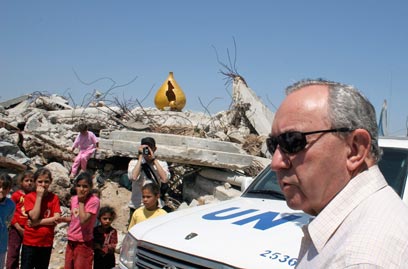
Judge Richard Goldstone in Gaza (Photo: AP)
In other words, even if the heads of state believe Israel is acting in a legal and moral fashion, the citizens on the street are threatening our legitimacy?
Benayahu: "Up until three years ago, there were two superpowers – the US and China. Today, Facebook is the third superpower. There are people that live there, get there information from there. One quarter of internet users use the blogosphere at the expense of print. The conventional terms of being a spokesman, public relations, and the media are making room for the huge place of public diplomacy.
"Today, legitimacy to take action is more important than achievements on the battlefield. This legitimacy must be manufactured prior to the action, during the action, and preserve it also after the action.
"A battalion commander who in the past went into action in Gaza or Lebanon would need intelligence, targets, soldiers, ammunition, and motivation. Today, he needs to understand that key foundations of international law. What he is permissible and what is forbidden. And to understand how the media works. Before he decides how to bomb a gas station, the military advocate general will tell him if he is allowed to at all, and I will tell him how to stand in front of the cameras and explain why he did it."
Does the battalion commander know this?
"Yes."
Does he know how to do it?
"We are making an effort. In the IDF, we have a school of communications and a center for communications training. A mobile unit passes through and teaches officers how to use the camera as a weapon, how to send a message in 20 seconds, how not to tell stories.
"Two weeks ago, these topics were deemed by the chief of staff at the end of a General Staff meeting part of the qualifications of relevant officers. To understand that a 10 year old child is filming you from the house across the street or from the mosque's minaret with a camera on his third generation cell phone can become a CNN correspondent within seconds.
"I did an entire information day dedicated to the question of how up-scale technology made in Silicon Valley or in the skyscrapers of Manhattan is applied with such force on the other end of the scale, in the world of darkness and ignorance in Iran. How one picture from a cell phone of the girl with a bullet in her head succeeded in doing damage to the government in Tehran that the US and the entire West together hadn't succeeded in doing.
"US Chairman of the Joint Chiefs of Staff Admiral Michael Mullen said it best when he said that if in the past PR was a supplement to operational forces, today PR is done with an operational supplement."
Berlin Festival battle
These dilemmas are not only coming to light during battles, but also during routine activities.
Alon: "Our conduct against the demonstrations in Naalin and Bilin, for instance, is becoming more sophisticated. It is clear that it is not something that is happening only along the fence between Kiryat Sefer and Bilin, but is part of a larger area of action that stretches from the Berlin Festival to articles published in the New York Times and Al-Quds Al-Arabi.
"On the other hand, there is a soldier there from the Armored Corps expected to prevent any physical damage to the fence. So I set up a team that has legal advisors, IDF Spokesperson Unit representatives, Shin Bet officials, and police investigators, and we look into the possibilities."
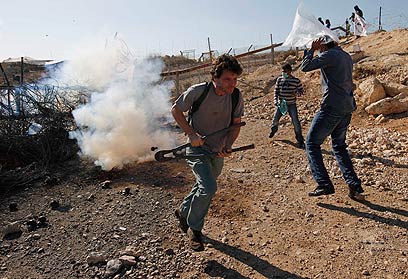
Anti-fence protest in Naalin (Photo: Reuters)
And what if the fence is demolished? No one is going to get hit with a rubber bullet?
"We also made a decision like this one. We said, with five years since the start of the protests, we are prepared to sustain damage to the wall in order to show that the claim made by the other side – that we don't allow legitimate protest and use violence to this end – is incorrect. So we said, let's let them harm the fence, throw some Molotov cocktail at our troops, and we will be prepared to take this."
Really?
"With certain limitations, of course. For instance, we won't allow our soldiers to be put in danger. But let's keep our cards straight. During the Second Lebanon War and Operation Cast Lead, the ones sitting next to the brigade commander were his intelligence officer and his intelligence commander, not the legal advisor and the spokesperson."
Dangot: "We must remember that the political system in Israel is the target of attack as of today. This started during the First Gulf War. This fact heightens the dilemma the military is in anyhow."
Because public pressure is higher? Say, in light of the rockets being fired at Sderot?
"Yes. Try to imagine a similar situation against tens of thousands long-range rockets. It necessitates that we be focused and effective in a short time."
Does this necessitate the use of a lot of force?
"It necessitates that we reach our target on a much shorter time schedule than in the past. It means we must be prepared, even while carrying out the operation, for defining events within Israel and their implications. For instance, a mass-casualty attack against civilians, a missile in Tel Aviv that hit a hospital."
In other words, the lawyers and media advisors need to move aside?
Alon: "I have three days to achieve my objective and not three weeks."
Or, like the battalion commander whom I spoke with said – in the end, I need to take my objective.
Benayahu: "Right. But now he has a legal advisor and a spokesperson as part of the organic headquarters of the brigade commander and a humanitarian officer who will make sure that the neighborhood mosque isn't blown up on the way to taking this target."
And yet, the Goldstone report and the harsh international response still resound.
Mandelblit: "I can't tell the people who are being shelled in Sderot, who lived in shelters for a long period, that I can't attack. We need to fight and win."
In other words, the next battle will either end in a victory or a report.
Alon: "No."
So, a victory and a report?
"That is part of the victory."
You said before that you are prepared to sustain damage to the wall and hold back even though your mission is to secure the wall.
"I said that I am considering additional aspects of the issue."
Mandelblit: "This is part of the price, and this doesn't need to intimidate us. This is precisely their goal – to tie our hands behind our backs operationally speaking. So that we won't dare make a decision to make an attack."
That is their weapon. They don't have tanks and airplanes.
"And still, we need to win operationally and protect our values and meet the criteria of international law. This is part of being professional. This is what we have done."
You ordered 500 soldiers be investigated following Operation Cast Lead. Claims were made that you did so only in order to placate international officials even though it was clear that a large part of the investigations would come up with nothing.
"This is an insignificant claim. I don't work for Goldstone, but neither do I work for the lawyers defending the soldiers. I investigate each and every claim. This obligates many people to testify. The fact is that until now, only three criminal indictments were issued until now and another two or three are being put up for disciplinary action."
Do the soldiers and their families feel insulted?
"Quite the opposite. The investigations in many cases revealed that the claims were baseless. In any case, I want to clarify once and for all – 500 soldiers were not investigated. If a claim was made that fire was opened at a civilian waving a white flag, I will clarify the matter. In order to do so, I need to take testimonies. So military police investigators will search the force that was there. We need to go through 60 commanders and soldiers. But these people are giving testimonies, not being investigated."
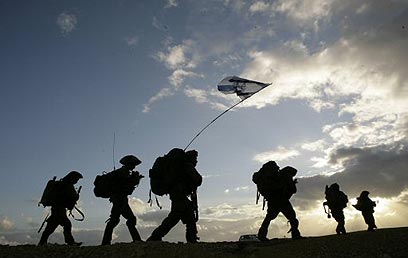
Soldiers leave Gaza after Cast Lead (Photo: Reuters)
Building legitimacy
Brig.-Gen. Alon, you're the field expert on our panel. Do you have a lawyer, a media advisor, and a humanitarian officer on your head?
Alon: "Not on my head, they help me."
Mandelblit: "During Cast Lead there were sensitive situations, in which I sat with the chief of staff and the commander of the Air Force in order to plan a particular target, because it was an important target, but we had to look at how to do it without causing casualties."
Dangot: "A humanitarian officer can give us information not only on the location of sensitive sites, but also about timing: prayer times, holidays, specific occasions. Maybe postponing or moving up an operation by a day can totally change its media effect."
Benayahu: "In any case, the question is whether in the eyes of the IDF their citizens come before ours."
And the answer?
Mandelblit: "If a battalion commander kills 200 or 300 people on his way to the target he has finished the war for the entire army. Who will back him up? Who will protect him?"
If it were that simple, black and white, we wouldn't need legal counsel or a humanitarian officer.
Benayahu: "True. The sensitivity to the lives of the soldiers does not come at the cost of sensitivity to others, but our soldiers will always come before theirs and our citizens before theirs. And if the dilemma is whether to let a Grad rocket fall on Ashkelon or hit the Grad, even if it entails damage in the Strip or, unfortunately, harm to civilians, I'm telling you – there's no dilemma here."
Alon: "There's no dilemma after the fact! Before there is definitely a dilemma, and we face these dilemmas every day. Sometimes they have legal aspects, and sometimes there are aspects of legitimacy. We waited a long time before Cast Lead in order to build up legitimacy for an operation."
Benayahu: "In order to understand how it works and how important legitimacy is, I will go back to Operation Grapes of Wrath in 1996. I was an advisor to the defense minister back then, Shimon Peres, and he was on an elections tour when we received information that citizens in Kfar Kana had been killed by Israeli fire.
"There wasn't easy access back then to international media like today, and there was no internet, but it appeared on CNN and Sky News. Towards the afternoon, when Peres came back from the north, he made a decision that there is no choice but to halt the operation. A press conference was scheduled for 9 pm, to give the chief of staff enough time to get his forces out of there under fire.
"Only at ten to nine the UN spokeswoman in Geneva announces that they know for certain from UNIFIL that Katyusha rockets had been fired from Kfar Kana in the past. On the way I give him a note with the UN report, he puts it in his pocket, and opens the press conference by reading the announcement, surprising the chief of staff and everyone else by announcing that the operation would go on."
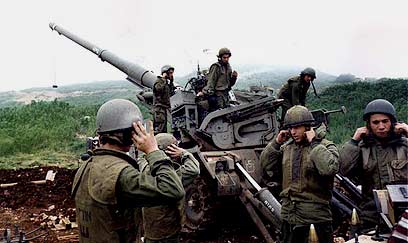
Operation Grapes of Wrath, 1996 (Photo: Emanuel Ilan)
And the lesson?
"International legitimacy is necessary. If you want a recent example, I was with the chief of staff in the US right when B'tselem published the story about the brigade commander in Naalin. We suddenly understood the force of this thing. You meet with the vice president and he keeps asking you about it. You go to the National Security Council and again, the same question. There is a huge effect to all of these stories on CNN on decision-makers."
Once flotilla left port, it won
Did this dictate the mode of operation on the flotilla, with the paint balls?
Alon: "I am not referring to the flotilla in a concrete manner. In principle, you can take mistakes and failures and make them into an ideology, but to say that this is the idea? I actually think the flotilla is the exception."
Meaning?
Alon: "These things are not mutually exclusive. We can climb a hill and prevent Katyusha fire from it without killing 300 civilians on the way. The understanding that we need to plan military missions with limitations is the essence of professionalism. Media, law, and legitimacy are not sub-objectives, they are components of the mission."
And there is another objective: Public refusal to accept casualties.
Alon: "That too, but it's from the same family."
From the same family as building public legitimacy?
Dangot: "During the First Lebanon War, the attack on Beirut and also later, it was a major factor affecting decisions. It's true that the commander's main office is to fight – to lead the force to complete the mission – but there's no doubt that his toolbox has been altered from the past."
During Cast Lead many Palestinians were hurt because efforts were made to limit our casualties.
"True. It's because of the proximity to the Second Lebanon War, in which there were many casualties. As an aide to the defense minister I saw the sensitivity of state officials to this issue."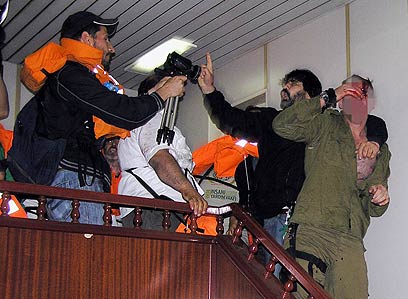
Soldier gets beaten by activists on board 'Marmara' flotilla ship
And that of investigation committees.
Benayahu: "The advocate general expressed this at his testimony before the Turkel committee, and there is really a feeling in the army that no matter what we do we somehow fall prey to some investigation."
Mandelblit: "It is the right of the state to probe as deeply as they need to. There was public pressure after the Yom Kippur War, after Sabra and Shatila, and even after the Second Lebanon War. But to establish a committee because of outside pressure?"
Benayahu: "Looking back on all of these investigations we can see that the army always played rather a small part in decision-making but a large part in taking responsibility, though I don't feel this emasculates commanders, in the meantime.
"On the matter of the flotilla you have to understand that once it had left the port, it won. Conflict with the IDF at sea was its goal, and all the rest is just damage control. We never thought for a moment to charter planes with 'Free Gilad Shalit' written on them, or put stickers on our ships and send them out with girls from the Navy dressed in white and carrying flowers. This is not what we do.
"Our goal was to stop this thing. By the way, even where the media was concerned, we succeeded within hours to turn the 'peace activists' into terrorists. The footage on Al-Jazeera, which showed our soldiers being beaten, are our legitimacy for the casualties on deck. If not for this footage, live, in color, I would have had a hard time achieving legitimacy for the necessary actions of our soldiers."
The feeling was that Israeli PR was doing too little too late.
"Because we wait with our announcements until the families who have serious casualties are notified, and they also have to pass through intelligence in order to keep from revealing methods. I don't like to say that I am satisfied, and there are a few lessons, but I think we have achieved these goals. The problem – and this is my claim for the Israeli media – is that it's always extreme. Either there's a scandal, and the entire military brass has to resign, or the people of Israel all stand up and give the IDF a round of applause."
- Follow Ynetnews on Facebook










